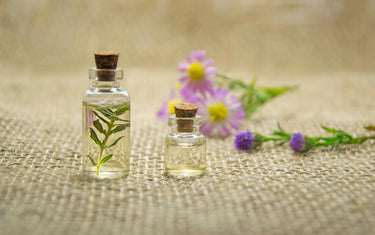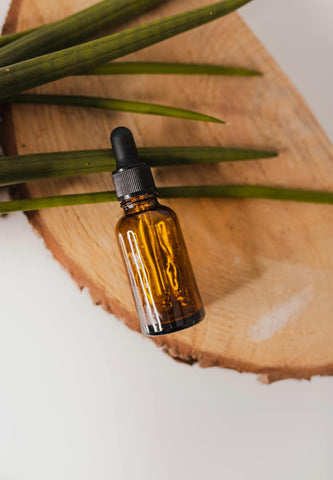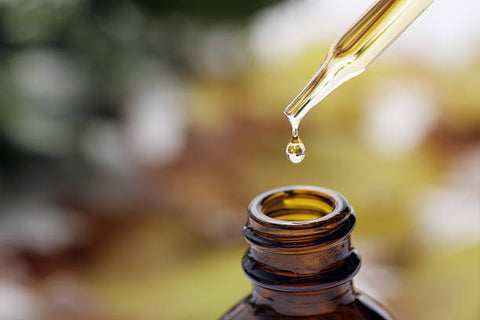3 min read / 12 March 2024 / yasmin sharp
Do Essential Oils Have Phthalates?
Explore the truth about phthalates in essential oils and how to choose safe, quality products.
Share this post

“Do essential oils have phthalates?” It’s a valid question worth asking, given there have been some concerns raised about the dangers posed to our health by phthalates.
Identifying compounds and chemicals used in any product can be something of a minefield, as not all companies are completely transparent about their ingredients and processes.
In this article we take a closer look at phthalates and essential oils to give you a better idea of what to expect.
What are phthalates?Phthalates (pronounced Thal-ates) are chemicals that are typically used to make plastic more flexible and tougher to break. They can also be used as a solvent or binding agent. Manufacturers first started using phthalates in the 1920s in insect repellents and as an additive in polyvinyl chloride (PVC). |

Can phthalates be harmful to people?
Whilst more research is needed, researchers believe phthalates may be able to affect hormonal balance, which could lead to a variety of health issues, including reproductive and developmental and certain types of cancers.
However, because research is ongoing, no solid conclusions have been reached yet.
Do Nikura essential oils contain phthalates?
All Nikura essential oils are 100% natural, pure, undiluted and vegan, which means they are made from natural components and substances.
Our fine fragrance oils are paraben and phthalate- free and our premium fragrance oils are paraben free.
Do essential oils contain phthalates?
Good quality essential oils should not contain phthalates, provided they go through the correct extraction and manufacturing procedures.
If you are wondering, “Are there phthalates in essential oils?”, pay close attention to labels and only buy from reputable, trusted brands that are wholly transparent about their products.
The word ‘quality’ is important here, as there can be some essential oils products that contain high levels of phthalates due to the way they are produced.

How can phthalates get into essential oils?
There are several ways phthalates can find their way into essential oils:
- Ingredient sourcing: Look for brands that source their ingredients from reliable suppliers and are open about their sourcing process. If raw materials are low in purity and quality this could influence the presence of phthalates.
- Extraction methods: Compared to solvent extraction, cold pressing and steam distillation are the most effective extraction methods, especially when it comes to ensuring lower levels of phthalates.
- Processing techniques: The processing stage is important when it comes to reducing the presence of phthalates in essential oils. If purification or filtration techniques are employed, this can remove impurities and lower the threat of contamination.
- Storage and handling: Storage is key to minimising exposure to phthalates. Whether it is during manufacturing or in your home, essential oils should be stored in dark glass bottles away from heat sources and direct sunlight.
- Quality assurance: Brands that have a strong quality assurance procedure are more likely to see lower levels of phthalates in their products. Ideally, they should be regularly checking for contaminants, including phthalates.
For anyone who is worried about coming into contact with phthalates, you can use the points above as a guideline to identify brands and products that provide good quality essential oils.
How to find phthalate-free essential oils
Use the tips below to find phthalate-free essential oils:
- Pay close attention to the label: Brands will be proud to state that their products are phthalate-free, so look closely at the label and avoid products that do not contain this information.
- Do your own research: To better understand the acronyms used by manufacturers, familiarise yourself with terms like DBP (dibutyl phthalate), DEP (diethyl phthalate) and others, as these are also words used to describe phthalates.
- Look for third-party certifications: Check the product labels or website for any official certifications they have been awarded by third parties to verify the quality of their products and any claims being made.
- Buy from trusted brands: Don’t just trust what a website tells you – carry out your own research about the quality of their products and dig deeper to see what kind of documentation they provide to qualify their transparency.

So, “Do essential oils contain phthalates?”. It all comes down to the quality of the product and the way the natural properties have been handled from source.
You can use our guideline above on how to find products that are phthalate-free or low in phthalates, which will hopefully give you more confidence in the brands you buy from.
[1] Centers for Disease Control and Prevention - Phthalates Factsheet https://www.cdc.gov/biomonitoring/Phthalates_FactSheet.html










